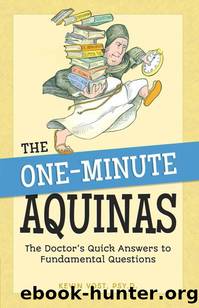One-Minute Aquinas: The Doctor's Quick Answers to Fundamental Questions by Vost Kevin

Author:Vost, Kevin [Vost, Kevin]
Language: ara
Format: epub
Tags: 978-1-622821-59-4
Publisher: Sophia Institute Press
Published: 2014-01-31T05:00:00+00:00
CHAPTER NINETEEN
Are You a Thinker or a Doer?
Accordingly, since certain men are especially intent on the contemplation of truth, while others are especially intent on external actions, it follows that manâs life is fittingly divided into active and contemplative.
â ST, II-II, Q. 179, art. 1
After having considered differences among people in terms of the special graces some receive, Thomas examines differences in the types of lives that Christians may be called to live. These primary callings are to the contemplative life, where a person focuses on the inward contemplation of truth, and the active life, where he focuses on external actions and affairs in the world. I think of such people as thinkers and doers (and lovers as well).161
These categories derive from the very nature of the human intellectual soul. âThe life of plants consists of nourishment and generation; the life of animals of sensation and movement; and the life of men in their understanding and acting according to reason.â162 God gave us the capacities to know truth and to act for good. We see this in the two main functions of our reasoning powers. By the workings of our speculative intellect, we contemplate truths and are perfected by the intellectual virtues of understanding, science, and reason. By the workings of our practical intellect, we get things done and are perfected by the virtues of art and prudence.
What do holy thinkers think?
Christian contemplatives are thinkers indeed, but they are far from professional academics or cool âMr. Spockâ types who analyze the world with reason alone in detachment from the truths they seek. Indeed, contemplatives seek the highest truths of God, and their wills are fired by their love for him. As Thomas notes, âThere is delight in the contemplative life, not only by reason of the contemplation itself, but also by reason of the Divine love.â163 Citing St. Gregory the Great, he expands on this theme: âThe contemplative life is sweetness exceedingly lovable; for it carries the soul away above itself, it opens heaven and discovers the spiritual world to the eyes of the mind.â164 Contemplation of God is a foretaste of the eternal bliss of the beatific vision of God, although in a very imperfect form here on earth â âfor the contemplation of wayfarers is imperfect, according to 1 Cor. 13:12, We see now through a glass in a dark manner.â165 It will be perfect in heaven when we see God âface to faceâ (1 Cor. 13:12).
Four things necessary to the contemplative life are obtained in this order: 1) moral virtues, which must be attained so we will not be disturbed by our passions or outward events and will be free to focus on truth; 2) intellectual preparation in the form of acts such as focusing our attention, studying, and reasoning, to set the stage for contemplation; 3) contemplation of divine effects, that is, of creatures and the workings of the world God created, which paves the way toward the final step: 4) contemplation of the divine truth of God, the origin and sustainer of all of creation.
Download
This site does not store any files on its server. We only index and link to content provided by other sites. Please contact the content providers to delete copyright contents if any and email us, we'll remove relevant links or contents immediately.
The Lost Art of Listening by Michael P. Nichols(7506)
Why I Am Not A Calvinist by Dr. Peter S. Ruckman(4153)
The Rosicrucians by Christopher McIntosh(3521)
Wicca: a guide for the solitary practitioner by Scott Cunningham(3179)
Signature in the Cell: DNA and the Evidence for Intelligent Design by Stephen C. Meyer(3138)
Real Sex by Lauren F. Winner(3023)
The Holy Spirit by Billy Graham(2953)
To Light a Sacred Flame by Silver RavenWolf(2823)
The End of Faith by Sam Harris(2742)
The Gnostic Gospels by Pagels Elaine(2531)
Waking Up by Sam Harris(2461)
Nine Parts of Desire by Geraldine Brooks(2369)
Jesus by Paul Johnson(2363)
Devil, The by Almond Philip C(2333)
The God delusion by Richard Dawkins(2309)
Heavens on Earth by Michael Shermer(2285)
Kundalini by Gopi Krishna(2185)
Chosen by God by R. C. Sproul(2165)
The Nature of Consciousness by Rupert Spira(2108)
